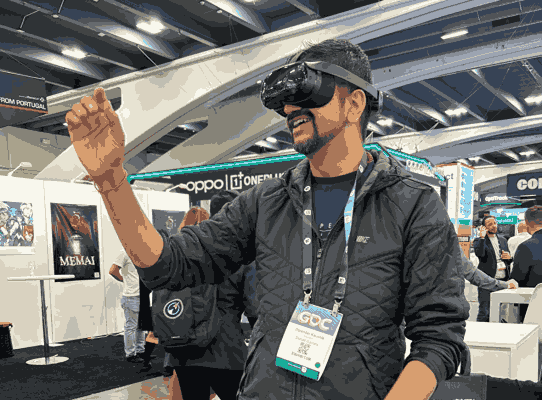AjnaLens participated in the Game Developers Conference (GDC) 2024, which took place in San Francisco, USA, from March 18th to 22nd. The GDC hosted top tech companies, including Meta and Microsoft.
AjnaLens showcased cutting-edge solutions, such as the AjnaVidya ecosystem, which allowed developers to create, publish, and grow XR apps. Other innovations included AjnaHPSC, which enabled high-performance spatial computing, AjnaKriti, which created 3D models from text, image, or video at a click, object tracking, and the AjnaChakra OS.
Developers faced various limitations when building high-quality XR applications, such as replicating real-world physics in an immersive environment, which was time-consuming and involved high costs for high-performance setups. AjnaHPSC on AjnaVidya eliminated these limitations by providing XR streaming directly to the AjnaXR headset, thereby removing the need for a high-performance PC setup. On the AjnaVidya ecosystem, developers could create 3D models at a click and find the audience to monetize their efforts. AjnaVidya was a one-stop solution for all XR application developers.
The AjnaLens team at GDC 2024 showcased innovations such as Ray Tracing, Path Tracing, and driving simulations using AjnaHPSC at Booth S945. This platform reinforced India’s standing as a global tech pioneer in the field of human-computer interactions.
In the words of Mr. Abhishek Tomar, CTO & Co-Founder of AjnaLens, “Our society may have progressed rapidly in terms of innovation and technology, but we have miles to go when it comes to humanity quotient. AjnaLens aims to Augment Human Intelligence and transform human life from a journey of prosperity to self-actualization.” As AjnaLens continues to push the boundaries of spatial computing, the future of XR and human intelligence shines brighter than ever before.
AjnaLens had earned the trust of industry giants like Qualcomm, Siemens, Nvidia, and Unreal Engine. Through partnerships with organizations such as L&T, Tata Technologies, and the Indian Armed Forces, AjnaLens had reshaped industries and impacted over 72,000 learners. The launch of AjnaVidya had heralded a new era of spatial computing, promising further enrichment across industries.


